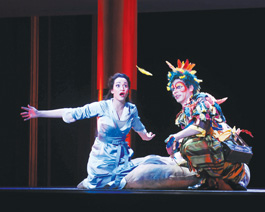home | metro silicon valley index | the arts | stage | review

Photograph by Pat Kirk
FEATHERS IN HIS CAP: Pamina (Khori Dastoor) is amazed by the feathered finery of Papageno (Daniel Cilli) in 'The Magic Flute.'
Birdman
Daniel Cilli's irascible Papageno inspires affection in Opera San José's 'Magic Flute'
By Scott MacClelland
IF THE GREATEST ART retains something of the spontaneous, then Mozart's Magic Flute passes the test. And if its mystique—as witnessed in the new Opera San José production Sunday afternoon—continued to haunt the imagination, one made it home just in time for Julie Taymor's 2004 Met production on KQED Encore. In "déjà-vu all over again," the New York version featured even more Asian-inflected costumes, makeup and scenery than OSJ's and, as Pamino plays his flute, a comparable menagerie of mythical animals cavorting.
"The Magic Flute is half mystery play, half street comedy," observes New Yorker critic Alex Ross. Its extreme musical range extends from Austrian folk song, assigned to Papageno, fierce Italian coloratura for the Queen of the Night and the Bach-style contrapuntal chorale of the two armored men. (The overture is also loaded with counterpoint.) Ironically, Tamino—the leading man—rarely takes the brass ring, which almost always goes instead to the "best supporting actor," Papageno. And so it was at Opera San José. For all his fine singing, Chris Bengochea never inspired the affection easily grabbed by Daniel Cilli's irascible birdman. Tamino never was the kind of role that best suits the naturally passionate Bengochea, and it doesn't persuasively develop; even the trials of fire and water don't give us a different or "refined" Tamino. (Arguably Tamino's best moment is his first, when the fearsome serpent causes him such fright that he faints dead away.)
Character development likewise eludes the rest of the company, except the Queen of the Night, who finally reveals her true colors by threatening to disown her daughter, Pamina, if by her own hand she does not kill Sarastro; Pamina herself, who inspires the greatest sympathy of all; and the chronically attention-deficient Papageno. In her company debut, Maria Alu's Queen, in vividly colorful costume and scimitar-topped headdress, cut a strong character but struggled to nail the high-speed stratospheric coloratura. Best of show was Khori Dastoor's Pamina, not only sympathetic but also, in her "Ach, ich fühls," subtly expressive and beautifully phrased. Cilli's flamboyant Papageno was athletic, masculine and sexy, not clownish as the role is often presented. Giovanna Hutchinson's similarly feathered Papagena made a fine match.
Silas Elash's Sarastro sustained suitable "wisdom" though his basso was shallow of profundo. And he missed an opportunity to underscore the irony of the character's righteous tyranny behind its protests of generosity. (Between Emanuel Schikaneder's lines, even the Masonic brotherhood indulges its own dark side.) Andrew Park's ugly and deceitful Monostatos lusted in character after Pamina. (His scene with his fellow slaves wrapping themselves up with a rope to the sound of Papageno's magic bells was the funniest of the day.) Clifton Romig's Speaker spoke with authority and a great "radio" voice.
The chorus once again showed its wide versatility, whether whispering from the wings or singing full out as the members of the brotherhood. Erik Flatmo's economical sets worked wonders in quick scene changes and, with Chris Maravich's lighting, sharply contrasted dark and light. Jose Maria Condemi's stage direction nicely imparted action and variety while conductor Barnaby Palmer paced the performance smoothly, though the symbolic three wind chords needed more authority each time. Anna Oliver obviously had fun designing the costumes.
THE MAGIC FLUTE, presented by Opera San José, plays April 25 and May 1 and 3 at 8pm and April 27 and May 4 at 3pm at the California Theatre, 345 S. First St., San Jose. Tickets are $66–$88. (408.475.4450)
Send a letter to the editor about this story.
|
|
|
|
|
|